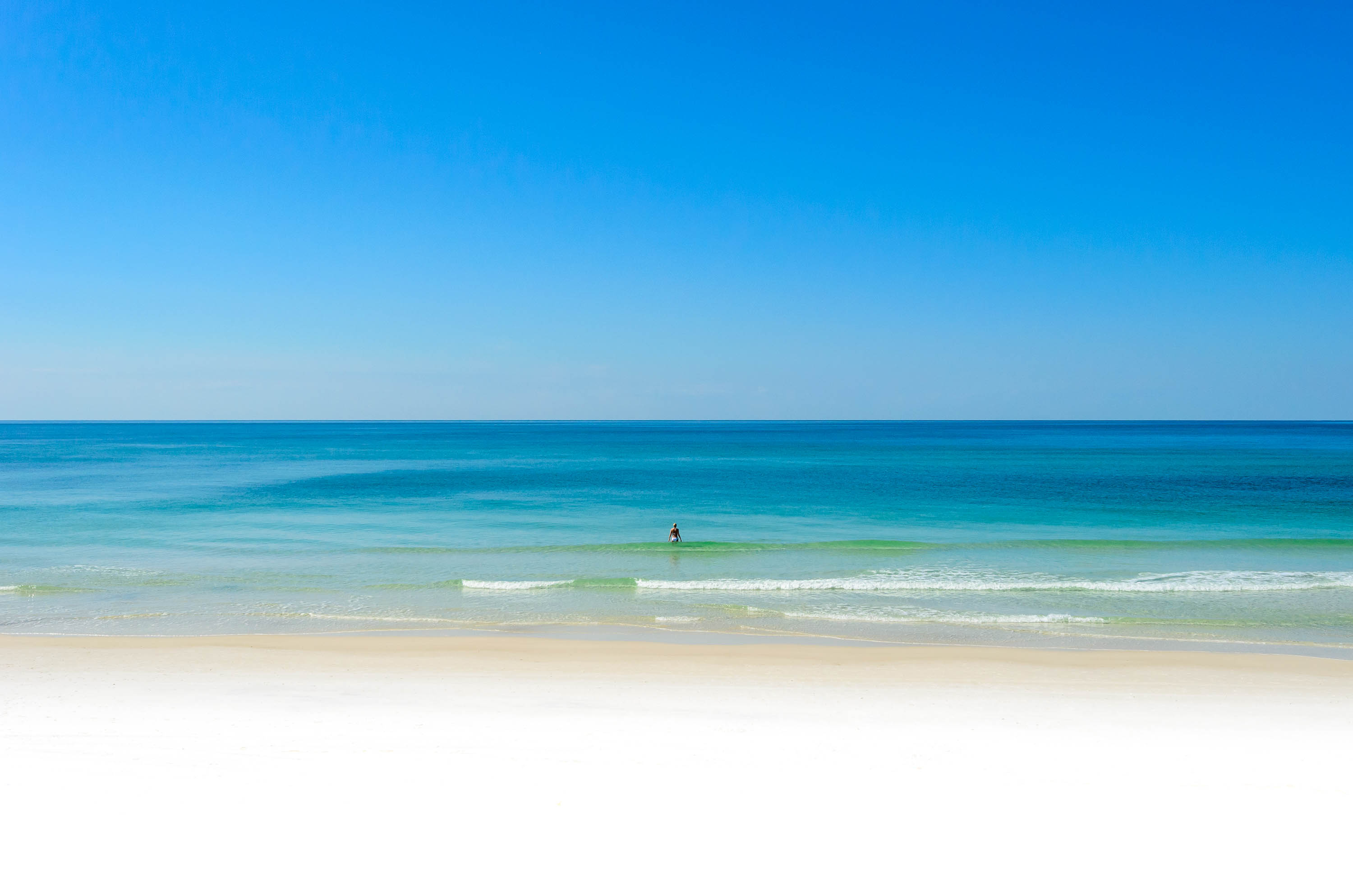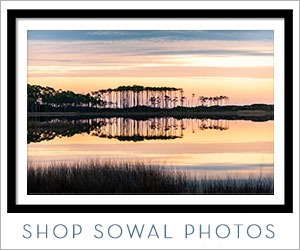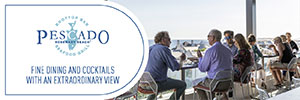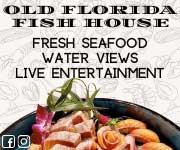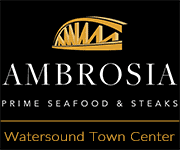This is Part Two:
But, maybe that was not the vision Hamp was having on that warm summer night, drinking beer, in the moonlight, next to the deserted swimming pool. It could have been different…
The year was 1967. The state of Florida was proposing a continuation of highway C30-A from Panama City through the southern half of Walton County, roughly, along the wilderness coastline. Before this was proposed, Highway 98 was the only major road connecting Ft. Walton Beach and Panama City. It took a direct line inland at Miramar Beach and cut straight through large pine forests to Inlet Beach, staying a healthy five or six miles from the Gulf in most places. Along this primitive stretch of beach, where the new road was proposed, was a spectacular stretch of white sand beaches, with towering sand dunes that nudged against forests of tall pines. Magnolias accented the bluffs, and everywhere else seemed to be a sea of palmettos and waist deep prairies of scrub oak. I use to ponder if someone could strap on some snow shoes, those wide tennis racket-looking things, and walk across the top of the tight carpet of scrub oaks. Interspersed in all this greenery was a string of majestic lakes of every size and shape. Some were fresh water, but most were coastal dune lakes that intermittently broke out into the Gulf, and then closed up again. It was mostly a wilderness with several small scattered settlements of beach cottages dotting the landscape, every once in a while. There was a settlement in Dune Allen and another in Seacrest. There was a modest group of houses in Seagrove, and, of course, the small town of Grayton Beach. But, that was the only traces of people in a vast majestic wilderness. To get to each of these villages, you took a long, two-lane, blacktop road that led you there from highway 98. Everything in between these places was just a vast, pristine stretch of paradise.
Sometime in 1967, a carload of four boys, just barely out of high school, took a left turn at Highway 395 south, the Seagrove Road, off of U.S. Highway 98. They were on their way to New Orleans from Jacksonville. It was a long drive, and they just wanted to get away; get off the beaten track. Something made them turn off the highway onto this primitive winding road, headed south. They had a crumpled map, but I think they just wanted to go where there were places that weren’t on any map. The Seagrove Road led to a place like that; a very small collection of one story cinder block beach cottages, spread out on a tall, tall bluff, overlooking the Gulf. And interspersed with the houses were grand majestic oak trees, twisted in fascinating shapes. It was obvious these trees had stood for hundreds of years against a multitude of storms. Huge magnolias were mingled with the oaks, towering stately tall compared to the oaks, and palmetto plants seemed to accent everything. The guys stopped at the one small local store, called Thornton’s Grocery, to get some gas, and to find out a little more about this place.
As luck would have it, there was somebody in the store at that moment that could help show them around. Cube McGee Jr. was sort of a handsome, dashing kind of guy. He seemed almost like somebody right out of a Hollywood movie. He almost always wore Hawaiian print shirts with wide lapels. He liked to wear a gold watch, a gold belt buckle, and sometimes even a gold medallion around his neck. He was always smiling, always charming, and always ready to show property for sale, when he wasn’t golfing. You see, his father was the man who founded Seagrove. C.H. McGee Sr. saw this property in the early 50’s, and saw a vision of what it could be. He subdivided it up into lots and put in a few gravel roads, and slowly sold a few pieces of land, and Cube Jr. helped the buyers build their beach cottages.
Cube took a liking to these strangers, and offered them a ride in his Willys jeep, which was something quite astonishing to them. They had never ridden in a jeep before, having grown up in the big city, and when Cube veered off the pavement onto a dirt road that quickly landed them onto the pristine white beaches of the Gulf of Mexico, it simply took their breath away. They motored east, laughing and joking, and with every breath of air, tinged with the taste and smell of salt, you could tell they were just rejuvenated. They had been on the road a long time, going from city to city, and this was all just too much.
Cube McGee Jr. drove them along the beach until they came to the Eastern Lake Inlet. It was truly an awesome experience to see one of these coastal lakes breach the barrier of sand between it and the Gulf and empty volumes of earthy brown fresh water into the sparkling, salty Gulf of Mexico. It was gushing out far too powerfully this morning, to cross in a jeep, so they parked there for a while and just gazed at the dunes, in the distance, east of there. The sand dunes stretched as far as the eye could see. After that, Cube led them up an old dirt road that led to Billy Wesley’s old cabin on the bluff overlooking the lake. The Gulf of Mexico lay glistening in the background. The story goes that the old cabin had been built with salvaged lumber from the old slave’s quarters at the Wesley Mansion in Point Washington, a small town about 5 miles inland from there, on the Choctawhatchee Bay. The cabin was surrounded by a canopy of scrub oaks.
“I like this one!” Paul exclaimed, as if he meant to purchase it on the spot. He seemed to be the leader of the bunch. The others agreed it was a wondrously nice piece of property, and all that. “But, what would we do with it?” the tall one, with funny looking round wire-rimmed glasses, asked. “Nothing,” was his instant reply. “We would do nothing… we would just let it be.”
The boys had been on the road, you see, touring America, playing music every night in packed auditoriums to millions of screaming fans. It had gotten a bit too much. The four young lads from a cold damp working port in England had been pasty white for nearly all their lives, and now, having felt a little sunshine on their faces at their last stop in Jacksonville, they were simply transported to a new and wondrous place, and they truly loved it.
If you were a King and you came upon a place as close to paradise as you will ever see, what would you do? Wouldn’t you try to buy it? Well, at that moment in time, in 1967, the Beatles were the Kings of Rock and Roll. They were not only the Kings, but they had buddies who weren’t doing so badly either. There were more than a few wild eyed dreamers playing brilliant guitar and singing with such inspiration that the whole wide world was just taking off. They were also making lots of money.
John, Paul, George, Ringo, and Cube spent the rest of the day driving in Cube’s old yellow Willys Jeep down every beach road they could find in South Walton County. There was no Highway C-30A, so they took each individual road, from Highway 98, a lazy two lane blacktop, down to Dune Allen, to Blue Mountain, and then lastly, to Grayton Beach. And it was there, sitting on the front steps of the Old Butler Store, sipping beers, that they vowed that there would never be a County Road 30-A. It was there that the plan was hatched to save paradise. Cube, in addition to being a hip, suave business man, also had connections to the politics of this sleepy county. With some luck, and a whole lot of money, 30-A could become a figment of someone’s imagination, and would soon be forgotten. The Beatles had their friendships with virtually all the upcoming stars of the rock world. With a pooling of money and a pooling of resources, the grand scheme came into being.
Somehow, all the land south of Highway 98 from Miramar to Inlet Beach was purchased and amalgamated by the Conglomerate. It was the Beatles, The Rolling Stones, The Who, Pink Floyd, Jimi Hendrix, and the list goes on and on. It was no small feat, getting all these acts together, but as someone once said, all you need is love, and of course, a whole lot of money. But more importantly was the vision: Let It Be. From that moment on, in the middle of 1967, there would be no more permanent construction in South Walton County. The Highway 98 corridor was completely open and ready for commercialization, but any and all new construction, south of there, was prohibited. The existing houses and stores could be renovated but only using historical preservation guidelines. There was to be no new asphalt ever to be applied to the existing roads. As they deteriorated, they could be patched with brick and cobblestone, which really didn’t matter much, since internal combustion engines were to be phased out in time, anyway.
Cube McGee Jr., some would say, had an easy life. His daddy started Seagrove, and from then on, all he had to do live there, and in the early days, take a little bit of money from the people that wanted to buy property there and help them build their dream homes. He was known to play a lot of golf. And that proved to be fortunate in the Beatles’ dream. Through his contacts on the golf links, Cube got to know the finest in electric golf carts, and the finest in electric golf cart builders and designers. This would later become invaluable. Through trial and error, it became apparent that banning all transportation would be untenable. Interesting things just developed from there. A crowd of condominiums, and hotels sprang up along both sides of 98, along with regular single family subdivisions. A vast number of outfitters and bicycle shops flourished, as well.
But the evolution of forest trails was by far the most satisfying aspect of the entire plan. There were, of course, main arteries that had to carry provisions to the various scattered meeting places and campgrounds. There was, of course, an initial problem of just what to call this vast pristine wilderness. Some people suggested Seagrove. Others, of course wanted it to be something like Grayton. Even stranger names were concocted, like Seaside, Seahaven, or SoWal, but, in the end, the lads settled on “Eleven Lakes”. It would evolve into a vast network of trails connecting “Inland”, Highway 98, to the Gulf of Mexico, but more importantly, to the Coastal Dune Lakes.
It, naturally enough, evolved into something of an ongoing, aquatic, music festival. Trails started out as paths that led to special spots. Certain places along the shorelines of these precious lakes just offered vistas of uncompromised natural beauty. As the paths slowly evolved to trails, these places changed to subtle camping grounds. Not far from these camping grounds, musicians would design small stages and amphitheaters in rather intimate scale, keeping these places as removed as possible from the places of quiet peace. In fact, the larger music spots were placed several miles inland from the lakes and gulf. They were designed as excavated bowls into the ground, which would help dampen the sounds to anyone outside the listening area. Along the lakes, there would be places to launch kayaks, canoes, and paddleboards, but there were no places where they would be parked permanently. Everything was brought in and brought out by ingenious, clever, top of the line, electric golf carts, or by cool pedal machines of every variety. The primary theme was leave nothing but your footprints.
While the flora remained much like the way it had been for millions of years, some people thought tweaking the fauna might be an amusing undertaking. Adding horses to the habitat was of course, a reasonable choice. Riding trails and stables grew up in various places. Because of the nature of the vast stretches of rolling white sand dunes, the implementation of camels seemed a fitting adventure. It was not an uncommon sight to see caravans of camels striking out through the wilderness laden down with kayaks, surfboards, and beach supplies, to find that perfect getaway on the gorgeous, white pristine beaches.
The list of exotic and sometimes amusing animals would go on and on. Each founding member was allowed to contribute one specie. Ostriches, kangaroos, and more than a few elegant peacocks could be seen roaming the region from time to time. I’m not sure why giraffes were chosen, but, to me, they always seemed to add an element of grandeur to the setting. Perhaps the species that was the most endearing to the visitors was the flock of pink flamingos that was propagated in the very early days by the introduction of just two of those sweet picturesque birds. For quite a while, everybody was always on the lookout for “Ringo’s Flamingos”.
Some people stayed around “Eleven Lakes” for days. Some people stayed and played for weeks. The lakes were playgrounds for people on kayaks and paddleboards. Nothing ever seemed permanent, and, as always, the golf carts brought provisions in, and carried happy “wilderness warriors”, back out. The existing structures evolved over time. Most became cabins or make-shift country stores to provide visitors with their daily supplies. The Beatles bought that old cabin on the bluff at Eastern Lake and made it into a down home rustic recording studio with primitive bunk beds for visiting musicians. Rumor has it that “Norwegian Wood” was written there, next to the old brick fireplace, on a cold December night, with a full moon rising over the lakeshore. The grand dame of all buildings south of 98 was, of course, the Old Butler Store, in the center of Grayton Beach. The building that had weathered so many storms before had a new challenge to confront. The Rolling Stones took it over, kept the same size and décor, and turned it into a blues bar. After days on the trails of “Eleven Lakes”, there was nothing better than to be sitting in old weathered beaten wooden booths, mellow in the afterglow of a perfect sunset, listening to a soothing fresh version of an old Muddy Waters song; blues and cold brews at The Old Butler Store. Some people said it was not an uncommon occurrence to see Sting sitting in on bass, on a warm summer night, mumbling something about somebody named Roxanne, and Keith Richards, loud and sassy, playing a deliciously deranged bartender, in full tilt.
“But, what about the s**t?” I asked Hampton, abruptly, as he rattled on about this vision of his. We were on our second joint, and somebody had pulled out a half bottle of Jack Daniel’s. The illusion was getting all too real, and I felt it necessary to punch holes in it. “What are people going to do about bathrooms in this wilderness? This wilderness with nothing permanent. What about the s**t?” It was then that Hampton flashed that cock-eyed grin of his. He took his final toke for the night, sipped the last of the Jack, laid out flat in the bed of the truck, looking up at the stars, and said simply “Porta-Potties”. In “Eleven Lakes”, this huge wilderness compound where nothing is permanent, and everything is changing naturally, as it should be, there would be truly portable Porta-Potties, almost everywhere. Not bright blue or pink plastic eyesores, but subtle boxes made up to look like bamboo tiki huts, with thatched roofs, or just like old common barnwood outhouses, with tin roof, rusted They would be everywhere, but almost unnoticeable, and the genius is that these portable toilets would be just coming and going, on electric golf carts, of course, and from then on, only the bears would have to s**t in the woods.
From time to time I think about those good old days at The Swimming Pool, when we just let our imaginations soar, and I think about some of the things Hamp use to say, and I just have to chuckle. Right now, I’m sitting in another major summer traffic jam, on Highway 30-A, and I’m sitting in my truck near Eastern Lake, heading west, and I’m in a line of cars maybe two and a half miles long, inching slowly towards the intersection of 395, and I really got to pee…
Sometimes, things just don’t really turn out quite like the way we wish they would. “Eleven Lakes” was surely an illusion, but an illusion of the most grand and honorable intent. Hampton had a knack for that, but now reality really beckoned. The truth is, lord knows, right now, I can feel a real need for a super duper deluxe tiki hut looking portable electric golf cart Porta-Potty, and I mean, right now… Hampton, I surely do wish you were here.
